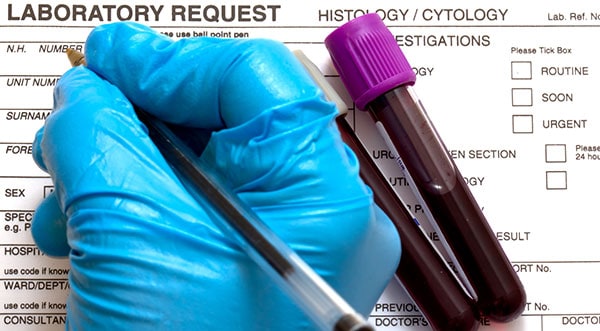Key Points
- If you have diabetes or high blood pressure, you have a higher risk for chronic kidney disease (CKD).
- Having your kidneys checked regularly gives you the best chance for finding and treating CKD early.
- Learn about kidney testing and what your results could mean.

CKD and kidney testing
CKD happens when your kidneys become damaged over time and can't filter your blood as well. Diabetes is a leading cause of CKD, and there are often no symptoms until your kidneys are badly damaged.
If you find and treat kidney disease early, you may be able to manage CKD and prevent other health complications. But the only way to know how well your kidneys are working is to get tested.
Urine tests
One of the earliest signs of kidney disease is when protein leaks into your urine (proteinuria). Urine testing can check for this. There are two types of urine tests that can check your protein levels.
Dipstick urine test. A dipstick is a chemically treated paper placed in your urine sample. It changes color if your levels are above normal. This test is often done as part of overall urine testing. It can also be done as a quick test to look for albumin (a protein produced by your liver) in your urine.
A dipstick urine test doesn't provide an exact measurement of albumin but does let your doctor know if your levels are normal. If you have abnormal albumin levels, your doctor may want to run further tests.
Urine albumin-to-creatinine ratio (UACR). This test measures the amount of albumin and compares it to the amount of creatinine (a normal waste product from your muscles) in your urine. A UACR test lets the doctor know how much albumin passes into your urine over a 24-hour period. A urine albumin test result of 30 or above may mean kidney disease.
It's important to know that:
- The test may be repeated once or twice to confirm the results.
- If you have kidney disease, your albumin level in your urine helps your doctor determine the best treatment option.
- If your urine albumin level stays the same or goes down, it means your treatment is working.
Serum creatinine
Because your kidneys remove waste, toxins, and extra fluid from the blood, blood tests can check your kidney function. They will show how well and how quickly your kidneys are doing their job to remove waste.
A serum creatinine blood test measures the amount of creatinine in your blood. If your kidneys aren't working well, your creatinine level goes up. Normal levels for you will depend on your sex, age, and muscle mass.
Usually a creatinine level more than 1.2 for women and 1.4 for men may mean the kidneys aren't working well.
Glomerular filtration rate (GFR)
The GFR is a blood test that measures how well your kidneys remove waste, toxins, and extra fluid from your blood. Your serum creatinine level, age, and sex are used to calculate your GFR number. Like other kidney tests, a normal GFR number for you will depend on your age and sex.
If your GFR is low, your kidneys are likely not working as they should. As kidney disease progresses, your GFR goes down. The results of your test can mean the following:
If your GFR is 60 or more together with a normal urine albumin test, you are in the normal range. But you'll still want to talk to your doctor about when you should be checked again.
If your GFR is less than 60, it may mean you have kidney disease. You'll want to talk to your doctor about treatment options that are best for you.
If your GFR is less than 15, it may mean your kidneys are failing. If your results show kidney failure, you'll likely need dialysis or a kidney transplant. If your GFR level is less than 20 over 6 to 12 months, your doctor may consider a kidney transplant.
Blood urea nitrogen (BUN)
A BUN is a blood test that measures the amount of urea nitrogen in your blood. Urea nitrogen is a waste product your body makes from the breakdown of protein in the foods you eat. Healthy kidneys filter urea nitrogen out of your blood, which leaves your body through your urine. This process helps keep your BUN level within a normal range.
A normal BUN level depends on your age and other health conditions, but usually ranges from 7 to 20. If your BUN level is higher than normal, this may be a sign that your kidneys aren't working well. As kidney disease progresses, your BUN level goes up.
